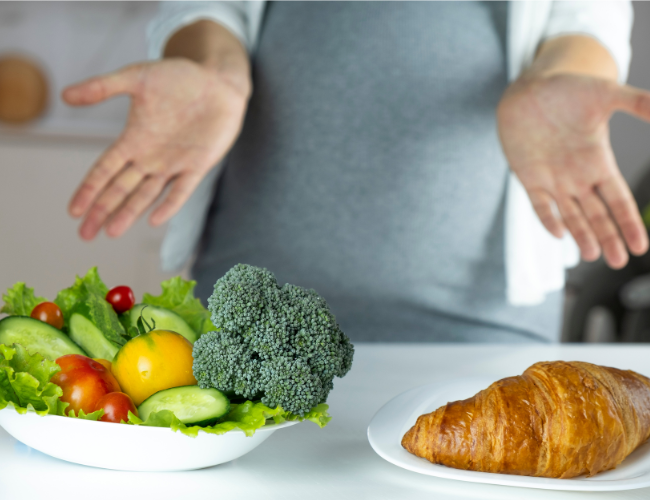To guide you through this crucial phase, we’ve compiled a comprehensive list of foods to avoid and those that require caution during pregnancy.
Whether it’s steering clear of alcohol or delving into the nuances of seafood consumption, here’s all you need to know.

‘Proceed with caution’ foods
1.Sugar substitutes
Expert advice for pregnant people on artificial sweeteners and “fake sugar” seems to be a mixed bag. Doctors advise that pregnant people avoid saccharin, the sugar substitute found in Sweet’N Low, because it can cross the placenta and stay in fetal tissue. Others cite a possible link to low-calorie sweeteners and high birth weights or child obesity. But other guidance, like that from the Mayo Clinic, is that artificial sweeteners are fine if consumed in small amounts or in moderation.
Bottom line: a diet soda here and there likely won’t be harmful to you and your baby. But if you think your diet is too sugary, talk to your doctor before replacing the real stuff with artificial or low-calorie sweeteners.
2.Caffeine
If you’re one of the many people who need a cup of joe to start the day, you might be wondering if you need to quit the habit.
Current guidance is that, while cutting out caffeine entirely is ideal, moderate consumption of less than 200mg a day doesn’t cause miscarriage or preterm birth, according to the American College of Obstetricians and Gynecologists. (A typical 8-ounce cup of coffee has about 96 mg of caffeine, for scale, but amounts vary based on the brew).
In addition to coffee, caffeine can be found in soda, chocolate, tea, energy drinks and other food and beverages.
Caffeine, like a lot of substances that you can metabolize efficiently, crosses the placental barrier, so it’s best to keep intake low for your growing baby. A study found that consuming 200 mg or more of caffeine a day increases the risk of miscarriage, but other research suggests even moderate caffeine consumption has been linked to low birth weight. If you have a history of miscarriage or are concerned about your caffeine intake, talk with your doctor.
3.Herbal tea
Caffeine is found in some teas, but herbal tea in pregnancy is a whole separate issue. The Mayo Clinic says to avoid drinking herbal tea while pregnant, unless your health care provider says it’s OK, because of limited data on the safety for you and your baby.
Herbal teas have been used by midwives and other people as cures for morning sickness and other pregnancy symptoms, but there’s still a lot we don’t know about the amount of herbs that are safe for pregnant people.
Some herbal teas that might be safe to drink in the first trimester are ginger tea and green tea (which contains caffeine) according to Australia’s Department of Health. You might add red raspberry leaf tea to the list in the second trimester (the tea is associated with uterine contractions, so the agency suggests you wait out the first three months).
Be careful not to drink too much as drinking three or more cups a day has been linked to an increased chance for spina bifida.
Some herbal teas to absolutely avoid during pregnancy include sage and parsley tea, which have both been linked to miscarriage, according to the Australian agency.
Bottom line: Ask your doctor before you drink, or continue drinking, herbal tea while pregnant. And that includes tea marketed as “pregnancy” tea.
4.Fish
Fish are an excellent source of protein and many have other awesome nutrients, including omega-3 fatty acids and, despite the long list of fish you can’t eat, there are a few you can include as part of a balanced diet.
The FDA recommends eating 8 to 12 ounces (about two or three servings) a week of safe-to-eat fish. Some of these fish to consider, per the Mayo Clinic, include: anchovies, catfish, cod, herring, light canned tuna, pacific oysters, pollock, salmon, sardines, shad, shrimp, tilapia and trout. White tuna is also OK, but stick to 6 ounces a week instead.
Like every person, every pregnancy has different needs and finding a diet that works best for one person may not be sustainable for you.
While it’s important to find foods that provide nutrients for you and your pregnancy, asking questions and considering your individual health can make eating healthy during pregnancy feel less restrictive. If you have questions about whether a food is safe to eat during pregnancy, contact your health care provider.
